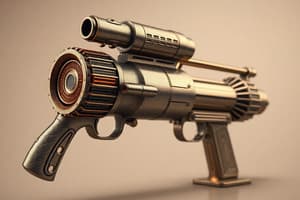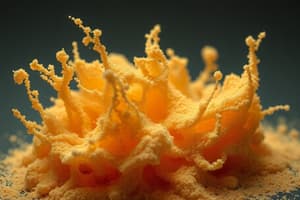Podcast
Questions and Answers
Which of the following is the first commercialized Powder Bed Fusion process?
Which of the following is the first commercialized Powder Bed Fusion process?
- Binder Jetting
- Direct Energy Deposition
- Selective Laser Sintering (correct)
- Fused Deposition Modeling
Powder Bed Fusion processes include only metallic materials.
Powder Bed Fusion processes include only metallic materials.
False (B)
What is one of the main powder fusion mechanisms mentioned in Powder Bed Fusion processes?
What is one of the main powder fusion mechanisms mentioned in Powder Bed Fusion processes?
Liquid-phase sintering
The first PBF process, Selective Laser Sintering, was developed at the __________.
The first PBF process, Selective Laser Sintering, was developed at the __________.
Match the following powder fusion mechanisms with their descriptions:
Match the following powder fusion mechanisms with their descriptions:
What happens to the rate constant as activation energy decreases?
What happens to the rate constant as activation energy decreases?
The activation energy of a catalyzed reaction is larger than that of an un-catalyzed reaction.
The activation energy of a catalyzed reaction is larger than that of an un-catalyzed reaction.
What is the rate constant found when the temperature is 289K, Activation Energy is 200kJ/mol, and pre-exponential factor is 9 M-1s-1?
What is the rate constant found when the temperature is 289K, Activation Energy is 200kJ/mol, and pre-exponential factor is 9 M-1s-1?
Chemically-induced sintering forms a by-product that binds the powder together with the help of ___________ reactions.
Chemically-induced sintering forms a by-product that binds the powder together with the help of ___________ reactions.
Match the following reactions to their resulting compounds:
Match the following reactions to their resulting compounds:
Which of the following is a disadvantage of chemically-induced sintering?
Which of the following is a disadvantage of chemically-induced sintering?
Liquid-Phase Sintering (LPS) is the most versatile mechanism for Powder Bed Fusion (PBF).
Liquid-Phase Sintering (LPS) is the most versatile mechanism for Powder Bed Fusion (PBF).
At what temperature is the rate constant 7 M-1s-1?
At what temperature is the rate constant 7 M-1s-1?
Which of the following processes is primarily used for producing plastic prototypes?
Which of the following processes is primarily used for producing plastic prototypes?
Thermoset polymers can be processed using Powder Bed Fusion into parts.
Thermoset polymers can be processed using Powder Bed Fusion into parts.
What is the typical thickness of the powder layers used in the polymer laser sintering process?
What is the typical thickness of the powder layers used in the polymer laser sintering process?
The build chamber for polymer laser sintering is filled with __________ gas to minimize oxidation.
The build chamber for polymer laser sintering is filled with __________ gas to minimize oxidation.
Match the following materials with their classification:
Match the following materials with their classification:
Which of these materials is commonly known to be processed using Powder Bed Fusion?
Which of these materials is commonly known to be processed using Powder Bed Fusion?
Infrared heaters are used in the polymer laser sintering process.
Infrared heaters are used in the polymer laser sintering process.
What are the two types of molecular structures found in thermoplastic polymers?
What are the two types of molecular structures found in thermoplastic polymers?
PBF technology is increasingly used for direct digital manufacturing of __________ products.
PBF technology is increasingly used for direct digital manufacturing of __________ products.
Which of the following materials is NOT typically processed with Powder Bed Fusion?
Which of the following materials is NOT typically processed with Powder Bed Fusion?
What is the primary purpose of LPS in powder processing?
What is the primary purpose of LPS in powder processing?
LPS can be used in additive manufacturing as a fusion mechanism.
LPS can be used in additive manufacturing as a fusion mechanism.
What is the common material used in PBF processing?
What is the common material used in PBF processing?
In LPS, the molten constituent acts as the ______ which binds the solid particles together.
In LPS, the molten constituent acts as the ______ which binds the solid particles together.
Which of the following materials is NOT typically used in PBF processing?
Which of the following materials is NOT typically used in PBF processing?
Match the following terms with their descriptions:
Match the following terms with their descriptions:
Full melting means that only a portion of the material is melted during PBF processing.
Full melting means that only a portion of the material is melted during PBF processing.
What are two engineering alloys mentioned as utilized in PBF processing?
What are two engineering alloys mentioned as utilized in PBF processing?
What is a characteristic of an electron beam when it interacts with gas at atmospheric pressure?
What is a characteristic of an electron beam when it interacts with gas at atmospheric pressure?
A laser beam requires a vacuum environment to function effectively.
A laser beam requires a vacuum environment to function effectively.
What is one of the primary benefits of using Powder Bed Fusion over other additive manufacturing processes?
What is one of the primary benefits of using Powder Bed Fusion over other additive manufacturing processes?
PBF processes typically have accuracy and surface finish that are __________ compared to liquid-based processes.
PBF processes typically have accuracy and surface finish that are __________ compared to liquid-based processes.
Match the following terms with their descriptions related to Powder Bed Fusion processes:
Match the following terms with their descriptions related to Powder Bed Fusion processes:
Which of the following describes one possible process parameter that can influence the final microstructure of materials in Powder Bed Fusion?
Which of the following describes one possible process parameter that can influence the final microstructure of materials in Powder Bed Fusion?
Materials with high thermal conductivity typically produce better accuracy in Powder Bed Fusion processes.
Materials with high thermal conductivity typically produce better accuracy in Powder Bed Fusion processes.
What is a common drawback of using larger powder particle sizes in Powder Bed Fusion?
What is a common drawback of using larger powder particle sizes in Powder Bed Fusion?
What is primarily used in Polymer Laser Sintering (pLS) machines to create parts?
What is primarily used in Polymer Laser Sintering (pLS) machines to create parts?
Electron Beam Melting (EBM) uses laser beams for metal fusion.
Electron Beam Melting (EBM) uses laser beams for metal fusion.
What materials are commonly processed in Polymer Laser Sintering machines?
What materials are commonly processed in Polymer Laser Sintering machines?
In EBM, a stream of __________ moving near the speed of light is used for particle fusion.
In EBM, a stream of __________ moving near the speed of light is used for particle fusion.
Match the following PBF process variants with their main characteristics:
Match the following PBF process variants with their main characteristics:
Which of the following statements about the atmosphere in Polymer Laser Sintering machines is true?
Which of the following statements about the atmosphere in Polymer Laser Sintering machines is true?
PLS machines are capable of directly processing pure metals.
PLS machines are capable of directly processing pure metals.
What is the primary advantage of using Electron Beam Melting compared to laser-based systems?
What is the primary advantage of using Electron Beam Melting compared to laser-based systems?
Which of the following is a primary approach used in extrusion processes?
Which of the following is a primary approach used in extrusion processes?
Fused deposition modeling (FDM) requires a fixed horizontal position for the extruder.
Fused deposition modeling (FDM) requires a fixed horizontal position for the extruder.
What is the purpose of bonding in extrusion-based systems?
What is the purpose of bonding in extrusion-based systems?
In extrusion-based systems, the term __________ refers to the control of the extruder's position during the printing process.
In extrusion-based systems, the term __________ refers to the control of the extruder's position during the printing process.
Match the following FDM related terms with their descriptions:
Match the following FDM related terms with their descriptions:
What limitation is often associated with FDM?
What limitation is often associated with FDM?
Contour crafting is considered one of the other systems in extrusion-based methods.
Contour crafting is considered one of the other systems in extrusion-based methods.
What is the significance of solidification in the extrusion-based process?
What is the significance of solidification in the extrusion-based process?
Flashcards
What is Powder Bed Fusion (PBF)?
What is Powder Bed Fusion (PBF)?
PBF is a type of additive manufacturing where a powder material is selectively fused together layer by layer using a focused energy source, like a laser or electron beam.
What is Selective Laser Sintering (SLS)?
What is Selective Laser Sintering (SLS)?
SLS is a specific PBF process where a laser beam selectively melts and fuses powdered material, creating a solid object layer by layer.
What materials can be used in PBF processes?
What materials can be used in PBF processes?
PBF processes are versatile and can use a wide range of materials, including polymers, metals, ceramics, and composites.
How does powder fusion happen in PBF processes?
How does powder fusion happen in PBF processes?
Signup and view all the flashcards
What are the main process parameters in PBF?
What are the main process parameters in PBF?
Signup and view all the flashcards
What is PBF?
What is PBF?
Signup and view all the flashcards
What are PBF process modifications?
What are PBF process modifications?
Signup and view all the flashcards
What is Laser Sintering (LS)?
What is Laser Sintering (LS)?
Signup and view all the flashcards
What is the basic principle of LS?
What is the basic principle of LS?
Signup and view all the flashcards
What is a Powder Leveling Roller?
What is a Powder Leveling Roller?
Signup and view all the flashcards
Why is nitrogen gas used in LS?
Why is nitrogen gas used in LS?
Signup and view all the flashcards
What materials can be used in LS?
What materials can be used in LS?
Signup and view all the flashcards
What are some examples of materials used in LS?
What are some examples of materials used in LS?
Signup and view all the flashcards
What is a key benefit of LS?
What is a key benefit of LS?
Signup and view all the flashcards
What is a difference between thermoplastic and thermoset polymers?
What is a difference between thermoplastic and thermoset polymers?
Signup and view all the flashcards
Arrhenius Equation
Arrhenius Equation
Signup and view all the flashcards
Activation Energy (Ea)
Activation Energy (Ea)
Signup and view all the flashcards
What effect does temperature have on the rate constant?
What effect does temperature have on the rate constant?
Signup and view all the flashcards
How does a catalyst impact activation energy?
How does a catalyst impact activation energy?
Signup and view all the flashcards
Chemically-induced Sintering
Chemically-induced Sintering
Signup and view all the flashcards
Liquid-Phase Sintering (LPS)
Liquid-Phase Sintering (LPS)
Signup and view all the flashcards
What is a common characteristic of chemically-induced sintering?
What is a common characteristic of chemically-induced sintering?
Signup and view all the flashcards
Why is post-processing often required in chemically-induced sintering?
Why is post-processing often required in chemically-induced sintering?
Signup and view all the flashcards
LPS
LPS
Signup and view all the flashcards
LPS in Powder Metallurgy
LPS in Powder Metallurgy
Signup and view all the flashcards
LPS in Additive Manufacturing
LPS in Additive Manufacturing
Signup and view all the flashcards
Full Melting
Full Melting
Signup and view all the flashcards
Full Melting in PBF
Full Melting in PBF
Signup and view all the flashcards
Materials for Full Melting
Materials for Full Melting
Signup and view all the flashcards
PBF Material Examples
PBF Material Examples
Signup and view all the flashcards
Full Melting in PBF
Full Melting in PBF
Signup and view all the flashcards
Why can't pLS process pure metals or ceramics?
Why can't pLS process pure metals or ceramics?
Signup and view all the flashcards
What are the most common materials used in pLS?
What are the most common materials used in pLS?
Signup and view all the flashcards
How does EBM differ from laser-based systems?
How does EBM differ from laser-based systems?
Signup and view all the flashcards
What are the benefits of EBM?
What are the benefits of EBM?
Signup and view all the flashcards
How does EBM achieve fusion?
How does EBM achieve fusion?
Signup and view all the flashcards
What are the key differences between EBM and SLM?
What are the key differences between EBM and SLM?
Signup and view all the flashcards
What is EBM used for?
What is EBM used for?
Signup and view all the flashcards
What is a key advantage of powder bed fusion (PBF)?
What is a key advantage of powder bed fusion (PBF)?
Signup and view all the flashcards
What is a key disadvantage of PBF?
What is a key disadvantage of PBF?
Signup and view all the flashcards
What is mask-based sintering?
What is mask-based sintering?
Signup and view all the flashcards
How does printing an absorptivity-enhancing agent work in PBF?
How does printing an absorptivity-enhancing agent work in PBF?
Signup and view all the flashcards
How does printing a sintering inhibitor work in PBF?
How does printing a sintering inhibitor work in PBF?
Signup and view all the flashcards
What is the benefit of using loose powder as a support material in PBF?
What is the benefit of using loose powder as a support material in PBF?
Signup and view all the flashcards
Extrusion-Based Systems: What are the two primary approaches?
Extrusion-Based Systems: What are the two primary approaches?
Signup and view all the flashcards
Material Loading
Material Loading
Signup and view all the flashcards
Liquification
Liquification
Signup and view all the flashcards
Extrusion
Extrusion
Signup and view all the flashcards
Solidification
Solidification
Signup and view all the flashcards
Positional Control
Positional Control
Signup and view all the flashcards
Fused Deposition Modeling (FDM)
Fused Deposition Modeling (FDM)
Signup and view all the flashcards
Bioextrusion: What is involved?
Bioextrusion: What is involved?
Signup and view all the flashcards
Study Notes
Chapter 5: Powder Bed Fusion Processes
- Powder bed fusion (PBF) is a paradigm approach
- PBF processes use lasers, electron beams, and other thermal sources for sintering
- The first commercial PBF process was Selective Laser Sintering (SLS)
- SLS is at the core of other PBF process variations
- Several types of materials are used including polymers, metals, and ceramics
Objectives
- Powder bed fusion processes
- SLS process description
- Materials (polymers, metals, and ceramics)
- Powder fusion mechanisms (solid-state, chemically induced, liquid-phase, and full melting)
- Part fabrication (metal and ceramic)
- Process parameters and modeling
- Powder handling
- PBF process variants and commercial machines
- Process benefits and drawbacks
- Conclusions
Materials
- Polymers (thermoplastic, thermoset)
- Metals (stainless steels, tool steels, titanium, nickel-based alloys, aluminum alloys, and cobalt-chromium alloys)
- Ceramics (aluminum oxide, titanium oxide, calcium hydroxyapatite)
Powder Fusion Mechanisms
- Solid-state sintering: Diffusion between particles to minimize surface area, necking and consolidation
- Chemically induced sintering: Chemical reactions between powders and atmospheric gases to form a by-product. Examples include SiO2 formation when sintering SiC in oxygen, ZrO2 formation when sintering ZrB2 in oxygen, and AIN formation when sintering Al in nitrogen.
- Liquid-phase sintering: Molten constituents act like glue to bind particles. Often uses lower-melting point additives like cobalt (Co) in tungsten carbide (WC) composites
- Full melting: Entire region of material gets melted to higher depths. This is most commonly associated with engineering metals and semi-crystalline polymers.
Part Fabrication
- Metal parts
- Ceramic parts
- Pattern methods to create metal parts (investment casting patterns or sand casting molds)
Process Parameters and Modeling
- Laser-related parameters (laser power, spot size, pulse duration, pulse frequency)
- Scan-related parameters (scan speed, scan spacing, and scan patterns)
- Powder-related parameters (particle shape, size, distribution, powder bed density, and layer thickness, absorptivity)
- Temperature-related parameters (powder bed temperature, powder feed temperature, material properties, etc. e.g. absorptivity)
- Applied Energy calculations: Melting pool formation, and characteristics are fundamentally determined by the total amount of energy the laser beam absorbs from the powder bed. The formula for energy density (Ea=P/(U*SP)), where P = laser power, U = scan velocity, and SP = scan spacing. Scan spacing, scan speed, and laser power affect energy density.
Powder Handling
- Challenges of powder delivery systems (e.g., shear forces, electrostatic forces, spreading issues, airborne powder).
- Methods to transport correct powder volumes to build platforms
- Methods for spreading and leveling powder layers, like doctor blades, rollers, or hoppers
PBF Process Variants and Commercial Machines
- SLS, Laser Sintering (LS), other 3D systems' low-temperature machines using CO2 lasers and nitrogen atmosphere. Specific types of commercial machines (e.g. from 3D Systems and EOS)
- Nylon polyamide (polymer) materials are most used.
- Melting and solidification characteristics
- Idealized polymer DSC curve for polymer laser sintering can be observed.
- 3D printing systems with powder feed systems, build platforms
- Machines with multiple heads for different materials.
Applied Energy Calculations and Scan Patterns
- Melt pool formation depends on how much energy the laser beam absorbed from the powder bed
- Formula for energy density (EA=P/(U * SP))
- Scan spacing (SP), scan speed (U), laser power (P) affect energy density -Different scan paths (e.g., contour, squares) can create different effects on the part, with implications for precision, accuracy, and material strength. -Process maps showing regions of power and scan speed combinations that result in each of the track types (as described by Childs et al.) have been characterized.
Optical Absorption vs Wavelength
- Different materials absorb different wavelengths differently (especially useful for selecting the right laser and material). Fiber lasers, N:YAG lasers, and CO2 lasers are common. Material absorptivity, and wavelengths associated with each laser type, are useful for determining the optimal conditions for a particular material.
Electron Beam Melting (EBM)
- High-energy electron beam for inducing fusion
- Uses a vacuum environment for operation
- The Electron beam is different from lasers.
- Table and figure showing key differences between EBM and SLS: such as thermal source, atmosphere, scanning, energy absorption, and other important features.
Line-wise and Layer-wise PBF Processes
- Mask-based sintering
- Printing of an absorptivity-enhancing agent (or a sintering inhibitor)
Process Benefits and Drawbacks
- PBF offers better accuracy and surface finish for particular materials
- PBF has advantages in part building time for some materials
- Challenges include accuracy and surface finish of parts using powder-based AM, minimum feature size, limited build rates, minimum layer thickness, shrinkage, and the handling of different powders.
Exercises
- Includes questions requiring application of Arrhenius equation, energy driving forces of different powder beds, advantages/disadvantages of binders in liquid-phase sintering, powder characteristics exploration (using standard kitchen ingredients), parameter limitations in nylon polyamide PBF, minimum laser dwell time calculations, and other process parameter explorations.
Studying That Suits You
Use AI to generate personalized quizzes and flashcards to suit your learning preferences.




